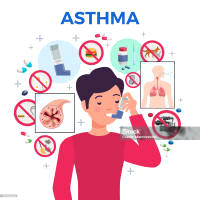Asthma Treatments

The treatment of asthma focuses on controlling the disease, minimizing symptoms, preventing attacks, and maintaining normal lung function. Each treatment plan is customized to the individual's specific symptoms and triggers and generally involves lifestyle modifications, avoidance of known triggers, and pharmacological interventions. The cornerstone of traditional asthma management includes inhaled corticosteroids, long-acting beta-agonists, and leukotriene modifiers, which aim to reduce inflammation and prevent exacerbation of symptoms.
Recent advancements in asthma treatment have expanded the scope of options available, integrating novel therapies alongside conventional treatments to better address the diverse manifestations of this chronic respiratory condition.
To effectively organize and present the information about asthma treatment &This table will clearly outline the variety of treatment options and emphasize key advancements and concepts in asthma management.
|
Treatment Type |
Description |
|
Inhaled Corticosteroids |
Reduce inflammation to control daily symptoms and minimize risk of severe asthma attacks. |
|
Long-Acting Beta-Agonists |
Used alongside inhaled corticosteroids to help keep asthma under control for a longer period. |
|
Leukotriene Modifiers |
Reduce swelling inside the airways and relax smooth muscles around the airways. |
|
Biologic Therapies |
Target specific molecules or pathways involved in the inflammatory process. Examples include Tezepelumab Shinkai and Yabuta (2023) |
|
Chinese Herbal Medicine |
Medicine Explored for cough variant asthma; studies focus on its safety and efficacy in conjunction with anti-inflammatory medications. Fan et al. (2019) |
Table: Summary of Asthma Treatments and Key Details
Asthma treatment has progressed significantly over the years, adapting to new scientific insights and patient needs. This evolution in care is driven by an understanding that effective asthma management requires a personalized and integrated approach. Each patient's treatment strategy is carefully tailored not only to mitigate symptoms but also to align with their specific environmental and physiological triggers. As we delve into the various aspects of modern asthma treatment, it becomes clear that a combination of personalized plans, innovative therapies, and careful medication management is essential for achieving optimal outcomes. Below are several key strategies that illustrate the current trends and advancements in asthma care:
-
Personalized Treatment Plans: Asthma treatment is customized to individual symptoms and triggers, incorporating lifestyle modifications and specific medications to effectively manage the condition.
-
Integration of Traditional and Novel Therapies: Recent advancements include novel biologic therapies like Tezepelumab, which complement traditional treatments by targeting specific inflammatory pathways, enhancing the efficacy and personalization of asthma management
-
Exploration of Alternative Treatments: Initiatives like studying Chinese herbal medicine for cough variant asthma highlight the integration of traditional remedies with modern medical practices, expanding therapeutic options.
-
Medication Management Concerns: Issues like the overprescription of short-acting β2-agonists emphasize the need for precise medication strategies to optimize treatment outcomes and patient safety.
-
Complexity and Customization in Management: The multifaceted nature of asthma treatment underscores the importance of a tailored, comprehensive approach to effectively control the condition and improve quality of life for asthma patients.
Please contact us by e-mail if you have questions or want more information.
Conclusion
Asthma remains a major global health issue, with increasing prevalence highlighting the need for better awareness and management strategies. It's essential to understand the varied symptoms and triggers of asthma to develop effective treatments. By improving awareness among patients, caregivers, and medical professionals, we can reduce its impact and improve life quality for those affected. Personalized treatment is key to enhancing outcomes, as it tailors interventions and deepens our understanding of asthma's complexities. Effective management involves a combination of medication, lifestyle changes, and education, helping those with asthma lead active lives. For up-to-date information and support, resources from organizations like the Global Initiative for Asthma, the American Lung Association, and the Asthma and Allergy Foundation of America are crucial.
Topic on the sidelines

Asthma impacts roughly 300 million people globally, posing a significant health challenge. On World Asthma Day, we examine the latest advances in asthma treatment and the quest for a cure. Traditional treatments like inhalers provide temporary relief but are not permanent solutions. Recent research offers hope, especially in understanding the microbiome's role in respiratory health. This introduction previews cutting-edge approaches that could transform asthma management and potentially lead to a cure.
If you'd like to learn more about, you can click here.
